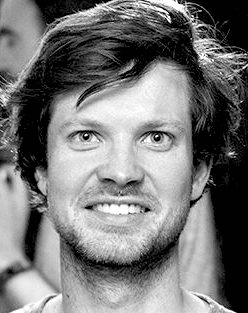Neil R Bramley

I am a cognitive scientist and Moore-Sloan post-doctoral associate in Todd Gureckis' computation and cognition lab and the Center for Data Science at New York University. I use interactive experiments and games combined with computational modeling to study how people learn, represent, and reason about the world.
A particular focus for me is the role of causality in cognition. How is causal knowledge learned through interactions with a causal world? How is it represented? And how do these representations support inference, thinking and goal directed action? A major lesson from machine learning is that these problems are intractable. Thus, a recurring theme in my work is exploring the mind's solutions to these problems of bounded, limited processing. I typically gather data from human subjects interacting with virtual causal worlds. Unlike standard psychology experiments, I focus on "open-world" tasks in which subjects have some control over their interactions. This allows me to collect revealing individual-level data, using subjects' information gathering behavior as well as their judgments to build detailed models of their individual processing and learning trajectories.
Publications
The documents distributed here have been provided as a means to ensure timely dissemination of scholarly and technical work on a noncommercial basis. Copyright and all rights therein are maintained by the authors or by other copyright holders, notwithstanding that they have offered their works here electronically. It is understood that all persons copying this information will adhere to the terms and constraints invoked by each author's copyright. These works may not be reposted without the explicit permission of the copyright holder.
Forthcoming
Coenen, A., Ruggeri, A., Bramley, N. R. & Gureckis, T. M. (submitted). Testing one or multiple: How beliefs about sparsity affect causal experimentation.
Bramley, N. R., Gerstenberg, T., Mayrhofer, R. & Lagnado, D. A. (submitted). The role of time in causal learning.
2017
Bramley, N. R., Mayrhofer, R., Gerstenberg, T. & Lagnado, D. A. (2017). Causal learning from interventions and dynamics in continuous time. In Proceedings of the 39th Annual Meeting of the Cognitive Science Society. Austin,
TX: Cognitive Science Society.
pdf, exp, video
Schulz, E., Klenske, E. D., Bramley, N. R. & Speekenbrink, M. (2017). Strategic exploration in human adaptive control. In Proceedings of the 39th Annual Meeting of the Cognitive Science Society. Austin,
TX: Cognitive Science Society.
pdf
Coenen, A., Bramley, N. R., Ruggeri, A. & Gureckis, T. M. (2017). Beliefs about sparsity affect causal experimentation. In Proceedings of the 39th Annual Meeting of the Cognitive Science Society. Austin,
TX: Cognitive Science Society.
pdf
Bramley, N. R., Dayan, P., Griffiths, T. L. & Lagnado, D. A. (2017). Formalizing Neurath's ship: Approximate algorithms for online causal learning. Psychological Review, Vol 124 (3), 301-338.
pdf, supplementary materials, figure 7d (corrected), figure 11d (corrected)
2016
Bramley, N. R., Gerstenberg, T. & Tenenbaum, J. B. (2016). Natural Science: Active learning in dynamic physical microworlds. In Papafragou, A., Grodner, D., Mirman, D., & Trueswell, J.C. (Eds.) Proceedings of the 38th Annual Meeting of the Cognitive Science Society (pp. 2567 - 2572). Austin,
TX: Cognitive Science Society.
pdf, supplementary materials
McCormack, T., Bramley, N. R., Frosch, C., Patrick, F. & Lagnado, D. A. (2016). Children's Use of Interventions to Learn Causal Structure. Journal of Experimental Child Psychology. 141, 1-22.
pdf
2015
Bramley, N. R., Dayan, P. & Lagnado, D. A. (2015). Staying afloat on Neurath's boat: Heuristics for sequential causal learning. In Noelle, D. C. et al (Eds.) Proceedings of the 37th Annual Meeting of the Cognitive Science Society (pp. 262-267). Austin,
TX: Cognitive Science Society.
pdf, exp 1, exp 2
Bramley, N. R., Lagnado, D. A. & Speekenbrink, M. (2015). Conservative forgetful scholars: How people learn causal structure through
interventions. Journal of Experimental Psychology: Learning, Memory & Cognition, Vol 41(3), 708-731.
pdf, exp 1, exp 2, data
2014
Bramley, N. R., Gerstenberg, T. & Lagnado, D. A (2014). The order of things: Inferring causal structure from temporal patterns. In P. Bello, M.
Guarini, M. McShane, & B. Scassellati (Eds.), Proceedings of the 36th Annual Meeting of the Cognitive Science Society (pp. 236-242). Austin,
TX: Cognitive Science Society.
pdf, demo, data
Theses
Bramley, N. R. (2017). Constructing the world: Active causal learning in cognition. PhD thesis, Experimental Psychology, UCL, London.
pdf, supplement
Bramley, N. R. (2013). Modelling active causal learning. MRes thesis, Computer science, UCL, London.
Bramley, N. R. (2011). Mechanisms of active causal learning. MSc thesis, Cognitive, Perceptual & Brain Sciences, UCL, London.
Bramley, N. R. (2009). Does physicalism entail panexperientialism? MA thesis, Philosophy, University of Glasgow.
Posters
Bramley, N. R., Nelson, J. D., Speekenbrink, M. Crupi, V., Lagnado, D. A. (2014). What should an active causal learner value? Poster presented at The Psychonomic Society Annual Meeting, Long Beach, California, USA.
pdf
Bramley, N. R., Lagnado, D. A. & Speekenbrink, M. (2013). Mechanisms of active causal learning. Poster presented at The 35th Annual Meeting of the Cogntive Science Society, Berlin, Germany.
pdf
Book reviews
Future-Minded: The Psychology of Agency and Control by Magda Osman.
link
Talk series
I host NYU ConCats, a semi-weekly informal discussion group for research related to psychology of concepts and categories. Fridays 1:00-2:30pm in Meyer 851, 6 Washington Place, NYU, New York, NY, 10003.
schedule
Until recently I hosted the London Judgment and Decision Making (LJDM) group seminar series. Wednesdays 17:00-18:30, 313, 26 Bedford Way, UCL, London, WC1H 0AP, UK.
schedule
Lectures
Active learning. For PSYCGD04: Knowledge, Learning & Inference, Experimental Psychology, UCL.
2014, 2016
Integrated information theory of consciousness. For PSYCGD01: Philosophy of Cognitive Science, Experimental Psychology, UCL.
2015a, 2015b
Causal learning in an imperfect world. For PSYC1103: Introduction to Psychological Experimentation, Experimental Psychology, UCL.
2014